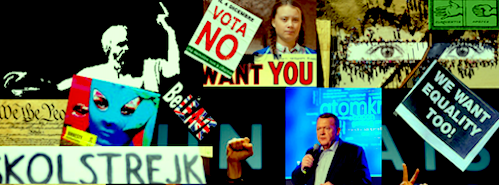Rhetoric
In the Section for Rhetoric, we are interested in the role of rhetoric in society and public discourse.

The Section for Rhetoric is a theoretically and methodologically diverse scholarly community in which communicative aspects of the human condition and society are studied and critiqued. Research in the section comprises historical as well as contemporary perspectives and takes an interest in rhetoric across digital and analogue contexts. How do rhetorical practices reflect a particular historical moment, thinking and values? How does rhetoric shape the times it is part of? How does the rhetoric of the past influence our time? How can rhetoric be a starting point for critical inquiry and innovation when it comes to societal challenges? As a research community, we strive to find answers to such questions on the assumption that symbolic action - whether in speech, writing or some other form - does something to and with us.
Researchers in the section work with various topics, for example, debate norms, rhetorical citizenship, official apologies, knowledge production, persona constructions in journalism, and the history of Danish rhetoric. Common for all researchers is a starting point in rhetorical theory and method, often in a cross-disciplinary integration with theory and methods from neighboring fields such as political theory, philosophy, linguistics, journalism and media studies, argumentation theory, anthropology, pedagogy, digital humanities, and gender studies. We work primarily with qualitative methods: textual analysis (close readings) of selected material, but we also use digital methods and do fieldwork to access more informal discourses.
The integration of rhetorical practice and theory on multiple levels is a cornerstone of the rhetorical tradition, and our teaching is committed to training students in practical communicative competencies and critical skills.
Examples of topics covered among our researchers:
- Political rhetoric and public debate
- Citizenship and democratic participation
- Social movements, activism, and protest rhetoric
- Crisis rhetoric, apologia, and official apologies
- The rhetoric of science and science activism
- Environmental and climate rhetoric
- Gender rhetoric
- Fact-checking and knowledge production
- Journalistic personas and literary journalism
- Speech writing
- Voice and body rhetoric
- Christian rhetoric
- The history of Danish rhetoric
- Corporate rhetoric
- New materialist rhetoric
- Rhetorical aesthetics
Tell me the truth: fact-checkers in an age of epistemic instability
Funding: Carlsberg Foundation
Project period: September 2022-August 2026
Contact: Mette Bengtsson
The Nordics and the world – rhetorical citizenship before, now and in the future (in Danish)
Funding: A.P. Moller Foundation
Project period: 2022-2025
Researchers
| Name | Title | Phone | |
|---|---|---|---|
| Bengtsson, Mette | Associate Professor | ||
| Berg, Kristine Marie | Associate Professor | +4535328412 | |
| Broberg, Frida Hviid | Postdoc | ||
| Bruhn, Tommy | Assistant Professor - Tenure Track | +4535337457 | |
| Christiansen, Agnete | Part-time Lecturer | ||
| Falkenberg-Klok, Nikolaj | Part-time Lecturer | +4535337955 | |
| Hansen, Sidsel Helweg-Møller Øst | Research Assistant | ||
| Isager, Christine | Associate Professor | +4535328115 | |
| Keitum Fisker, Thore | Research Assistant | +4535334934 | |
| Kock, Christian | Professor Emeritus | +4535328880 | |
| Krabbe, Karoline | PhD Fellow | +4535335035 | |
| Pedersen, Hanne Smith | Part-time Lecturer | ||
| Pietrucci, Pamela | Associate Professor | +4535330924 | |
| Roer, Hanne | Associate Professor | +4535329432 | |
| Schousboe, Sabina | PhD Fellow | +4535329793 | |
| Therkildsen, Martin Fehr | Part-time Lecturer | ||
| Villadsen, Lisa Storm | Professor | +4535328885 |
